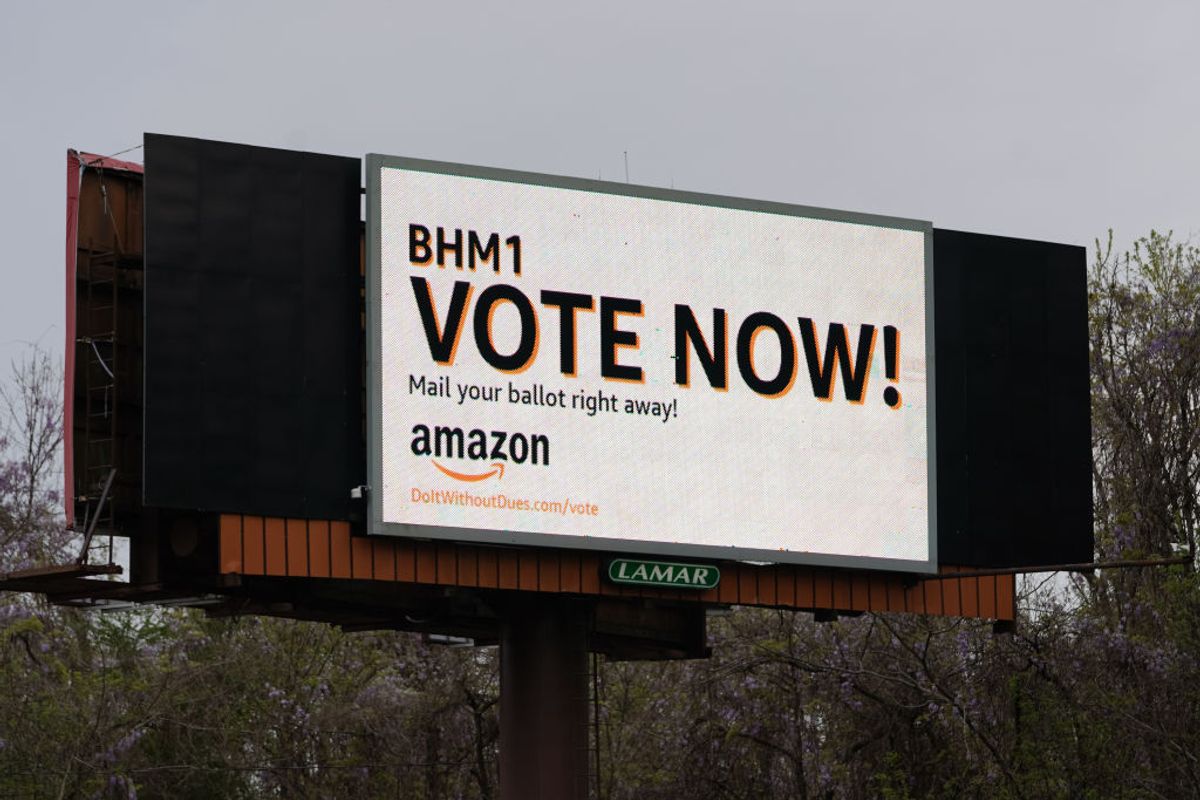Recent polls indicate the labor unions are more popular today than they have been in the previous few decades. A Gallup poll late last year showed that favorable attitudes toward unions had risen to 65% in the United States. Another poll indicated that if given the chance, 48% of workers would choose to join one.
But in the United States, only 10.7% of workers are members of unions, and in the private sector the figure is a dismal 6.3%. Exhibit No. 1 on why there is such a wide gap between the desire for union representation and the reality is the unsuccessful unionization drive at the Amazon warehouse in Bessemer, Alabama.
Last week the Retail, Wholesale and Department Store Union (RWDSU) and the broader labor movement suffered a decisive defeat, losing the union election by a large margin. Finger-pointing started immediately with union experts, organizers and activists accusing the RWDSU of inadequate preparation and tactical malfeasance. Criticism focused on the low percentage of union support cards that were signed to trigger the election and the failure — due to COVID — to conduct house visits with workers.
Regardless of the union's approach, the primary reasons for anemic unionization rates in the United States are the pervasive anti-union practices of American business and labor laws that make it unlikely, even in the best of circumstances, for unions to prevail in elections conducted by the National Labor Relations Board (NLRB). Labor attorney Thomas Geoghegan described the NLRB process as akin to a "bloodless bureaucratic death squad."
In Bessemer, according to RWDSU lead organizer Joshua Brewer, so-called "captive meetings" became Amazon's most effective tactic for turning their employees against the union. "Amazon wanted to third-party the union," Brewer said on the eve of the election vote, by telling the employees that the union was not the workers themselves but an "outside entity" that would be harmful to their interests.
It is difficult for the professionals and intellectuals — a group including America's pundits — to imagine the pressure put on workers in a regimented environment where they are subjected to weekly mandatory meetings and battered by managers with incessant anti-union propaganda. Workers are assured that voting for the union will restrict wage and benefit increases, that the union will use dues money to buy luxury automobiles for their staff and that Amazon could respond to a positive union vote by leaving town.
According to Darryl Richardson, an Amazon warehouse employee, when he tried to challenge managers at the anti-union lectures, he was shut down and isolated. "When I tried to ask them why, if the union was so bad, they were fighting so hard to keep it out, they said, 'Mr. Richardson, we will talk to you after the meeting.'"
Imagine a political election where one side has everyday access to voters and control over their livelihood while the other side's ability to communicate with voters is severely restricted, and you get a picture of how lopsided our labor laws have become. In the case of Amazon, even the employee bathrooms were not free from anti-union propaganda. Amazon was so fearful of a union victory that they spent millions of dollars to stop the effort.
Steve Rosenthal, former political director of the AFL-CIO, pointed out after the election results were announced that the odds of a union victory were daunting. "It was particularly difficult in this case," Rosenthal said, "against one of the most powerful corporations in the world that pulled out every stop to harass and intimidate workers."
* * *
Labor law in the United States, which has always been a function of both politics and working-class strength or weakness, can be revised to expand rather than diminish workers' voices on the job.
In Canada, for instance, four provinces — Quebec, New Brunswick, Prince Edward Island, and Newfoundland and Labrador — simplify the process so that merely signing enough cards demanding union representation is sufficient to gain collective bargaining rights. Drawn-out union elections where highly paid union-busting consultants can influence the vote are thereby avoided. In Quebec, the percentage of private sector workers represented by unions is almost four times what it is in the United States.
"Frankly," Chris Roberts, the director of social and economic policy for the Canadian Labour Congress, pointed out, "much of what Amazon did to oppose the union in this election would be illegal in Canada."
Another key advantage that Amazon had was political and cultural power. Outside of actor Danny Glover, who visited the Bessemer workers in support of the union, few Hollywood liberals — who are quick to express their views about human rights violations around the world — spoke out on behalf of the mostly African American workforce. Jeff Bezos, the billionaire founder of Amazon, is, of course, a major Hollywood producer as well as owner of The Washington Post.
And at the entrance to the massive Amazon complex—the warehouse itself is 13 football fields long — a local Bessemer City police car guarded the gate, a message to workers that even the city opposed the union effort. Amazon had contracted with the city to provide "protection" by off-duty cops while using publicly owned police cars.
A week before the election, an off-duty policeman left the Amazon property and pulled over this reporter on a public street to inform me that it was illegal to "trespass" on Amazon property. It was a bizarre occurrence in which an off-duty Bessemer police officer was impersonating an on-duty Bessemer police officer.
Meanwhile, labor activists and their political supporters will debate the lessons learned from this defeat. In March, the U.S. House of Representatives passed the Protect the Right to Organize (PRO) Act, legislation that would, among other reforms, make captive meetings illegal during union organizing elections. But the likelihood of the PRO Act becoming law is minimal as there are not enough votes to override a Republican filibuster in an evenly divided Senate. And unlike minimum wage laws where states can set standards above the federal level, federal law does not allow for pro-labor states like California to set up their own more organizing-friendly NLRB election process.
The union loss in Alabama was less a missed opportunity than what political science professor Tracy Roof has described, in reference to an earlier period of labor conflict, as a "missing opportunity," a situation where the union's chances for success were severely limited. In the public sector, where federal, state and local governments can't or don't use the tactics that the private sector can, unions win a much higher percentage of elections. Close to 35% of public sector employees are represented by a union.
As organized labor once again regroups, there should be a thorough assessment of what went right and wrong in Bessemer.
So long as American corporate practices are used to turn human beings into robots through surveillance and unrelenting "productivity" speedups, unions will remain a necessity. Economists have documented that there is a clear relationship between the decline of unions and increasing inequality.
Organized labor needs better-trained organizers and more thoughtful strategies. More importantly, however, the country needs an overhaul of a legal system that allows, indeed encourages, corporations to intimidate and threaten workers with impunity. Unions have suffered severe defeats in the past only to bounce back in unexpected ways. A new generation of organizers and activist allies is now searching for ways to rebound again.
Copyright 2021 Capital & Main




Shares